#i just have jane boleyn anne boleyn feels
Text
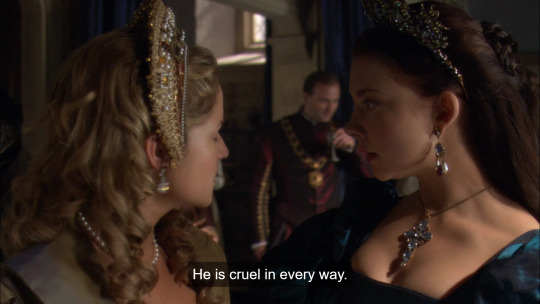
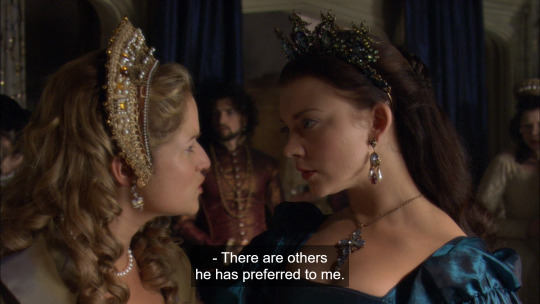
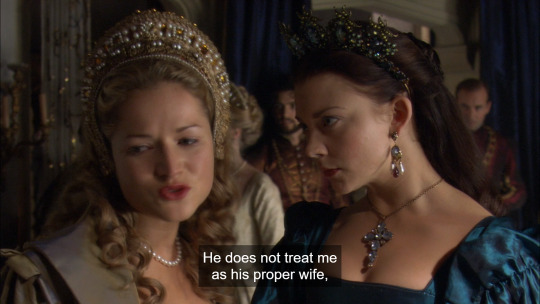

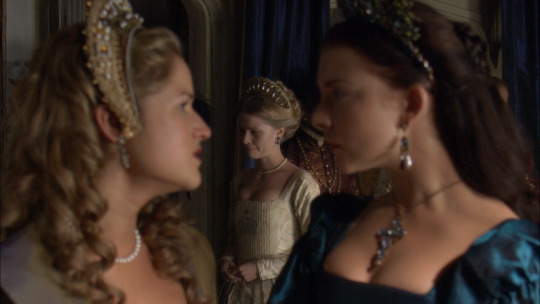
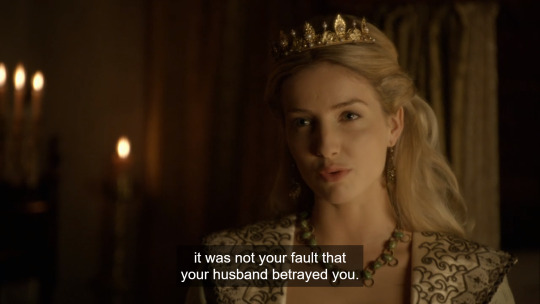

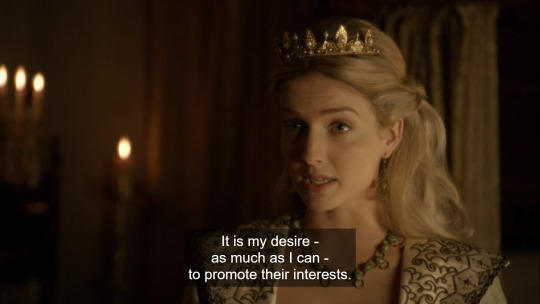
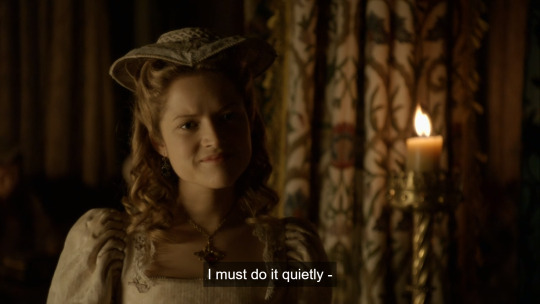

they really did write an entirely different character for s3, huh?
#i mean this speech always felt a little thin considering the s2 arc#but i never caught this specifically#she does not give a fuuuuck about jane boleyn in s2#she's clearly upset and she's smirking in the bg. and scripts are intentional. if she was to look sort of sad or pensive that would be#the direction...#she has like a nice little moment with madge in s2 but there's zero continuity here#granted this is not a great colour on anne as a character here either#she's at best treating her sister in law as a nuisance#she's condescending to her and clearly just trying to mitigate reputational harm to her family#but she does for all that have an emotional reaction; pity at least#she certainly doesn't find it amusing#really turned amy dunne into andie once the dust settled.#and it was...reallllly boring and not at all believable#thus this feels...very shoehorned in#*sad or pensive or pitying#i must do it quietlyyy~#ie i was doing it all along it was just quietly#sorry you didn't notice :)#the tudors#and that's not even touching on how insane this pat little speech is considering how she came to the throne#'it was not your fault that your husband betrayed you' hmm?#also for all that viewers (apparently? damn) hated anne when the first season premiered#this is a marked contrast to anne in the first season#who is very circumspect in the background when she's serving the queen#not smirking or giggling#she only confronts when she is confronted first#you even see her tenderly smiling in the bg when princess mary is being honoured with her mother#obviously that shifts once mary becomes a threat but this just comes from...nowhere#there's no similar scene of jane smiling sweetly at elizabeth in the bg of s2#yet in this scene we also have her go out of her way to send her money? lol
11 notes
·
View notes
Text
nah cuz if I was Parr I would high-key start crying when this happens😭😭😭

#Six#Six the Musical#Anne Boleyn#Katherine Howard#Kathryn Howard#Jane Seymour#Anna of Cleves#Anne of Cleves#Catherine of Aragon#Catherine Parr#NAH CUZ THIS IS ONE OF MY WORST FEARS MAN😭😭#I FEEL PARRS ANXIETY EVERY TIME I SEE THIS SCENE#JUST THE THOUGHT OF YOU MAKING A POINT AND EVERYONE TEAMING UP ON YOU TO MAKE YOU LOOK LIKE THE VILLIAN/YOU NOT WANTING TO PLAY BY THE RULE#AND AND-#😭😭😭😭😭#AND THEN HER TRYING TO EXPLAIN THATS NOT WHAT SHE MEANT#AND THEN THEY STARTED CLAPPING-#I COULD NEVER#ID HAVE A BREAKDOWN
24 notes
·
View notes
Text
I just kinned the Bg3 companions with my little pony characters (it was relevant to thr post I reblogged I swear) which has reminded me of my love of kinning.
So.
Bg3 companions as SIX queens.
Apparently my blog is just Bg3 + musicals now.
Okay!
These don’t fit perfectly but whatever.
Also spoilers for backstories and character quests.
Lae’zel is Catherine of Aragon, and No Way is her talking to Vlaakith. She was perfect and devoted and then turns out Vlaakith sucks and now hates her even though she was the perfect devoted follower. Also low key the drum breakdown is giving military to me, idk why.
Anne Boleyn is Gale because 1. Confident, 2. I just want him to be silly. As a treat. Lose Your Head is him talking about his relationship with Mystra and how not feeling good enough for her drove him to do reckless things that ended up getting him banished/basically sentenced to death.
Jane Seymour is Shadowheart because she put up with the abuse for a long ass time and also emotional repression, and grief of her parents paralleling Jane’s grief for herself and her son.
Anna of Cleves is Karlach. She has the best attitude out of all of them and the most self-confidence, and even though her good times are cut short (regardless of which ending she gets) she’s having a great time while she’s here.
Katherine Howard is Astarion. Because… yeah.
Catherine Parr is Wyll. Voice of reason, wants to be known for who he is outside of his abuser (Mizora, maybe his dad too idk) and has tons of accomplishments unrelated to his abuse. I also feel like without Tav he’d be the voice of reason and the one to help everyone through their shit.
21 notes
·
View notes
Note
I’m curious…what is your opinion of Henry’s relationship with each of his wves?
Oh my goodness gracious, thank you for this, Anon! (This got ridiculously long so I’m putting it under a cut)
Okay I guess I’ll start with Catherine of Aragon since she never gets to go first…
Hot take (not really) but I don’t think she and Henry had this great romantic love. And, for the record, I think it was mutual. I don’t think either of them loved each other in a romantic way. However, I also don’t think that Henry married her because he was forced to…because who forced him? His father? Yeah, Henry claimed later on that he only married Catherine because it was his father’s “dying wish” (or something to that effect) but we don’t know if that’s actually true and also, Henry denounced the betrothal in 1505 and no one forced him to go through with it regardless. And, certainly, none of the naysayers were forcing him to go through with it. Catherine apologists make so much of Henry uses the “brother’s widow” excuse during the Great Matter and completely gloss over the fact that there were multiple people also citing this as a reason during the period of Catherine’s widowhood.
I think, what it came down to, was that Henry knew that Catherine had been living in wealthy poverty and was maybe not being treated very kindly by his father, and Henry was also dealing with his own poor treatment by his father, and so Henry saw himself as this knight in shining armor rescuing the damsel in distress. Of course, Henry and Catherine had also known each other for almost a decade—it’s hard to know exactly what their relationship was like during those years because I doubt they really interacted much, but if Catherine was kind to him then that would add to why Henry was so okay with ignoring the naysayers. And then, in the early years of their marriage, Henry came to admire and respect her.
Where things get complicated is the issue of their children. I remember once seeing this article Suzannah Lipscomb wrote where she speculated how their marriage would be if Henry, Duke of Cornwall had lived and Suzannah made it out to be that everything was all rainbows and sunshine and she was his beloved wife forever etc etc. That’s great, Suzy, but I really don’t think it’s, at all, realistic. Certainly, if Catherine had had a healthy son who survived, Henry wouldn’t have divorced her even after she hit menopause. But Ithink it’s very optimistic to say their marriage would’ve been perfect. Obviously, losing so many children didn’t help. But, like I said, I don’t think Henry was deeply in love with her, so I think it’s inevitable that he would’ve strayed (I guess is the right word?).
On to Anne (strap in y’all this already way too long answer is gonna get even longer).
So I mentioned how I don’t think Henry was really romantically in love with Catherine. I think that Anne was the first time (and the last time actually) that Henry genuinely, properly, fell in love with someone (sorry Bessie stans…do those exist? Probably…somewhere…I definitely feel like I’ve seen at least one person try to argue that Bessie was the great love of his life). Anyway, yeah I think Henry had all of these grand romantic ideas about himself and he believed himself to be in love with every pretty girl…and then he met Anne and his brain just short-circuited. (And, who can blame him, I mean Anne Boleyn is obviously the most perfect woman whose ever existed, I’m in love with her 😂). In all seriousness, Henry didn’t have the great passionate love with Catherine but he definitely had it with Anne. We could talk about what went wrong in that relationship, but I’ve already stated my opinion on that and almost got run off of Tumblr for it.
So moving on to Jane…
Oh dear. It amazes me how many people still believe Henry’s own propaganda. So, unfortunately, for those of you, it’s very clear to me that Henry never loved Jane at all. He treated her pretty poorly while she was alive. I think she appealed to him because she wasn’t Anne. After she died, he fell head over heels with the idea of her. But that’s about it.
Now, lucky number 4.
I feel like I don’t really need to say much about this one. Henry made his feelings about Anna pretty clear.
I guess I could talk about their post-divorce relationship. What’s sad is that I think Anna could’ve actually been good for him. She comes across as a pretty chill person, but she also enjoyed a lot of the same things that he enjoyed. I think, if Henry had just not done that stupid thing of thinking that he was still 20 years old and that Anna would magically recognize him somehow, then I think they could’ve been brilliant together.
Onto Katheryn number 2.
I feel like this one is pretty self-explanatory. Henry was getting old, he couldn’t exercise like he used to, he had mobility issues, he was becoming obese…and Katheryn made him feel young again. What’s interesting comparing Katheryn and Anne’s downfall—Anne died because she was powerful, Katheryn died because she was powerless.I mean, it’s not insignificant that Katheryn’s downfall took months while Anne’s took just a few weeks. Obviously, the suspicion of Katheryn committing adultery was embarrassing for him, but she stuck around so long under house arrest because the only real threat Katheryn posed was to Henry’s ego.
Yee-haw, it’s Kathryn Parr (any Rex Factor fans out there?)
This one I also feel like is pretty self-explanatory. By this point, Henry has alienated and killed everyone who ever cared about him so, naturally, he’s feeling pretty lonely. What I find most interesting is that Kathryn was older and more mature and, obviously learned. I think with Jane, especially, and to a lesser-extent, Katheryn, Henry was kind of over intelligent women who could stand up to him. But I get the sense that, after Katheryn’s execution, he kind of got tired of the subservient wife. I think Henry actually preferred intelligent, feisty women, but things had gone so horribly wrong with Anne that he wanted the opposite. But then he quickly got bored of the opposite. Obviously, at this point in Henry’s life he’s really not interested in anyone standing up to him or trying to impose their opinions on him, but he still wanted someone he could have a conversation with. And Kathryn, bless her, was clever enough to match him intellectually without pushing the boundaries too much.
Wow, this got so insanely long. I’ll put it under a cut so it doesn’t clog up anyone’s feed.
But, you know, when I really spell it out like this, it just emphasizes how frustrating it is when all the wives get lumped together and the last few even get largely ignored. Because, for all of them, their circumstances for becoming Henry’s wife were completely different, and all of their relationships with him are completely different. People act like him having six wves was inevitable or that his choices were completely random. On one level, I can understand why people lump them together in this neat “Six Wives” package but doing that completely ignores the fact that they were individuals, not just a part of this rotating door of arbitrarily chosen women.
#henry viii#catherine of aragon#katherine of aragon#anne boleyn#jane seymour#anna of cleves#anne of cleves#katheryn howard#katherine howard#catherine howard#kathryn parr#catherine parr#ask
15 notes
·
View notes
Text
Okay I've had this idea in my head for a couple days now and since the show officially dropped I think it's a good time to share: HAZBIN HOTEL SIX AU
Valentino would be Henry the Eighth, Vox would be Catherine of Aragon, Velvette would be Anne Boleyn, Angel Dust would be Katherine Howard, and I uh. Have no idea who the others would be tbh. Those four fit so fucking well with the songs but I don't... have any ideas for the others. Maybe Charlie as Catherine Parr? Like that could work? Maybe? The best I personally can think of for Anna of Cleves would MAYBE, maybe be Fizzorolli but that is a fuckin STRETCH(no pun intended). I have no FUCKING clue who Jane Seymour would be though. There is not a single character in that show I could imagine singing Heart of Stone. Not one of them. If yall have any ideas feel free to share ig-
I don't reaaaally know how I feel abt Six AUs. Like on the one hand I do love assigning different characters to different songs and exploring how the lyrics might change meaning in a different context, and Six is like my favorite musical ever so OF COURSE Im gonna do that with the songs from it, but on the other. Six is about real people. Fictionalized versions of them sure, but they were still. Real. So sorry if I don't rlly do anything with this concept, I just wanna get it out there lol
#six#six the musical#six au#hazbin hotel#hazbin valentino#hazbin vox#hazbin velvette#angel dust#charlie morningstar#fizzarolli#late night ramblings
20 notes
·
View notes
Text
Ok but why is it that in my HC (headcannon) Catalina doesn't change much from her 1500s self to reincarnation yet for Anne there is a huge difference!?
For Catalina, the only difference would probably be slight face changes (the jawline for example maybe), having broad shoulders and muscles in reincarnation cause women can be able to go to the gym, and maybe being slightly taller than what she was in the 1500s.
Anne Boleyn on the other hand, would have a large difference from her appearance and possibly personality in the 1500s to reincarnation.
1500s Anne is regal, grace, and will not hesitate to punch in the face if she can get away with it without consequences. She's witty and smart making her have multiple suitors, but she is brutally honest on her opinion on them, so feelings would probably be hurt depending on what her thoughts are on you. Appearance wise, she's 2 centimeters shorter than Jane and Jane being a centimeter shorter than Aragon. Her face being similar to the popular blonde girls you would see in movies, but not so peachy when they smile however the smirks would seem similar.
But the minute I hear reincarnation Anne, I just imagine the most chaotic gremlin to ever set foot in the universe. A whole head shorter than Aragon! cause you know the whole beheaded thing... She has more instructive thoughts and is more likely to do them despite any punishment or scolding Jane or Aragon would give her. Anne would have a rounder face and be a little more cheeky than her in the 1500s.
There are similarities between 1500s Anne and reincarnation Anne. Such as their smirks and the way they can genuinely smile. They are both social allowing them both to have many friends and allies. They both know how to put an act too! Both would always have a passion for theater no matter what timeline they're in.
Anyways, that's my tedtalk about 1500s and Reincarnation Araleyn ^^
35 notes
·
View notes
Text
Anne of the Thousand Days Review: Part 1
Alright, so I got around to writing this review, and boy do I have some hot takes! Fair warning, though; this is so long I'll need to post this in two parts.
“For six years, this year, and this, and this, and this, I did not love him. And then I did. Then I was his. I can count the days I was his in hundreds … In all one thousand days. Just a thousand. strange. And of those thousand, one when we were both in love, only one, when our loves met and overlapped and were both mine and his. And when I no longer hated him, he began to hate me.”
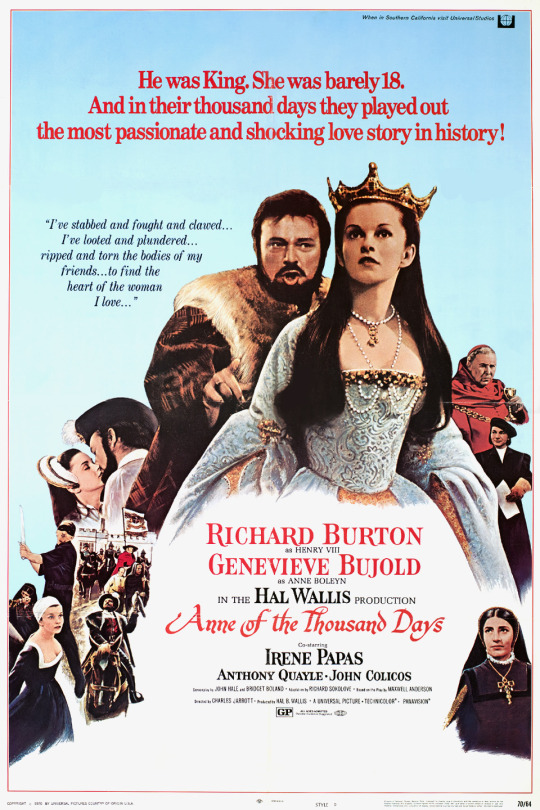
Where do I even begin with this review? I disliked this movie when I first watched it, and after a rewatch, I still dislike it. Anne of the Thousand Days is a tedious slog of a movie which somehow both has a fundamentally weird premise and forgets its own premise at times, especially in its marketing. The poster for this movie claimed that it showed “the most passionate and shocking love story in history!” As we’ll see, though, it’s hard to claim this depiction of Henry and Anne have a grand love affair when they only mutually love each other, at least in Anne’s telling, for one day.

Anne of the Thousand Days started as a Broadway play in 1948, written by American playwright Maxwell Anderson. With Rex Harrison as Henry VIII and Joyce Redman as Anne Boleyn, the play was a critical and commercial success, running for nearly 300 shows. However, as it dealt with themes of adultery, illegitimacy, and incest, Anne of the Thousand Days ran afoul of the Hays Code, so it took over two decades to be adapted into a movie. Most of the blank verse of the play was removed, many scenes were expanded into two, three, or four, and Anne was given a monologue about Elizabeth’s future greatness to shout at Henry in the Tower. Richard Burton was cast as Henry, and the virtually unknown French-Canadian actress Genevieve Bujold was cast as Anne. Burton’s wife Elizabeth Taylor feared the two were having an affair, so she managed to obtain a cameo to keep an eye on them. Taylor had actually lobbied for the role of Anne, but at 37, she was deemed too old for Anne, who (following the scholarship of the time) aged from 18 to 29 over the course of the film. One can only wonder…
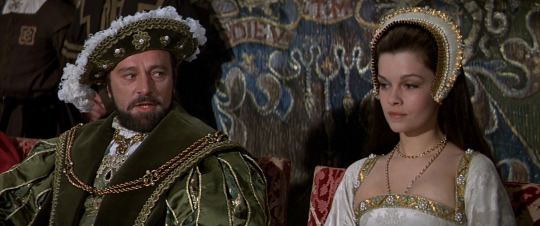
The movie follows the basic outlines of history, with a heavy emphasis on “outlines”. The opening scene is of Henry agonizing whether to sign Anne’s death warrant, as we soon transition into a palace ball where Henry falls for the vivacious and charming Anne as his sober, pious wife Catherine of Aragon despairingly looks on. He orders his chief minister, Cardinal Wolsey, to break up Anne’s relationship with the “Northern clodhopper” Harry Percy, much to her fury. She vigorously resists Henry’s advances, her resolve only strengthened by her pregnant sister Mary, who gave in to Henry and now carries his child. Mary prophetically warns, “The moment you’re conquered, he’ll walk away.” Despite Anne’s utter refusal to return his feelings, Henry continues to “love” (yes, the quotes are necessary) Anne, and eventually proposes divorcing Catherine and making Anne queen. She accepts, but unfortunately, political circumstances abroad combine to make it clear that the Pope will not grant Henry a divorce. Having fired Wolsey for his failure to get the divorce, and encouraged by his new chief minister Thomas Cromwell (and to a lesser extent, Anne) to break with Rome to get his way, Henry does so. After a tense confrontation, Anne finally tells Henry that she loves him, and they sleep together; she soon becomes pregnant and they’re married in a shotgun, bigamous wedding.
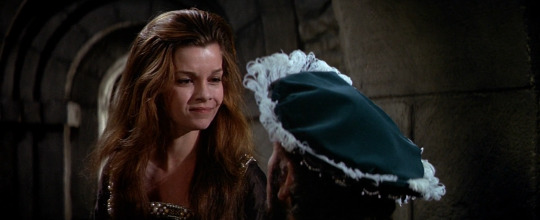
Anne is reviled at the coronation, but despite Henry’s hopes and Anne’s promises, she gives birth to a daughter, Elizabeth. Henry is furious and his eye begins to wander towards Anne’s lady-in-waiting Jane Seymour. Anne is furious and demands that Henry make everyone swear an oath recognizing their daughter as his legitimate heir on pain of death, leading to the execution of Sir Thomas More. Anne promptly miscarries a boy and Henry, believing his marriage accursed, orders Cromwell to find a way out. Cromwell soon trumps up charges of adultery with five men, incest with her brother George, and treason, which lead to Anne’s arrest. At her trial, though, Henry suddenly (and ahistorically) bursts in and manages to get the only one of the five who confessed to admit he lied under torture. Henry is still unsure of whether Anne is guilty, and he confronts her in the Tower. Anne utterly refuses to agree to an annulment, even if it means her death, and lies to Henry to hurt his manhood, declaring that she cheated on him with countless men, finding them far better lovers. For good measure, she then proclaims, “Elizabeth shall be a greater queen than any king of yours. She shall rule a greater England than you could ever have built! Yes - my Elizabeth shall be queen. And my blood will have been well-spent.” Henry promptly signs her death warrant and Anne is beheaded by a French swordsman, the movie ending with a shot of the toddler Elizabeth walking towards her destiny.

Incredibly, I did like some stuff about this movie. The costumes, designed by Margaret Furse, are exquisite and mostly accurate; if nothing else, this movie deserved its Best Costume Design Oscar. Even the fact that Genevieve Bujold’s French hoods nearly always lack a proper veil doesn’t matter, in my opinion, since she manages to pull it off. The coronation procession was absolutely stunning, and the recreation of the Tower of London is incredible; they really minimized the distance between Tower Green and St Peter ad Vincula, though. Despite not using surviving Tudor pieces, the score, composed by Georges Delerue, manages to evoke the period really well.
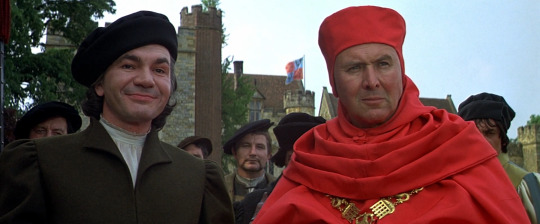
Concerning the performances, I loved Anthony Quayle’s depiction of Cardinal Wolsey, as he goes from a self-assured, powerful man to a broken, fallen minister. His final scene is heartbreaking, and Quayle humanizes him throughout; even when he breaks up Anne and Harry Percy, he doesn’t seem thoughtlessly cruel. John Colicos’ portrayal of Cromwell as “a man without scruple” is a delightfully villainous characterization, a schemer who owns up to his villainy and revels in manipulation.
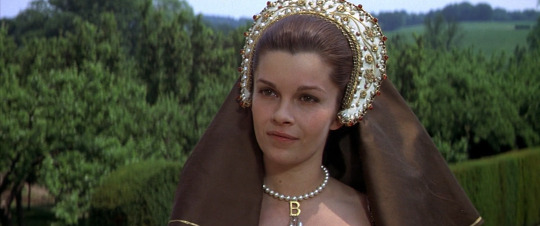
A review of Anne of the Thousand Days, of course, would be incomplete without a discussion of Genevieve Bujold’s Anne Boleyn. While not one of my top three favorite Anne Boleyn portrayals (for the record, Natalie Dormer, Dorothy Tutin, and Claire Foy), Bujold does a good job with Anne. She compellingly portrays Anne’s growth (and increasing ruthlessness) from a lovestruck teenager to a fiercely protective mother, as you can see her grow and harden over the course of the movie. She also captures Anne’s boldness and vivacity of spirit well, although sometimes to the point of straining credulity. Would the real Anne have maintained Henry’s love if she told him at the start of their relationship, “You’re spoiled and vengeful and bloody. Your poetry is sour and your music worse. You make love as you eat - with a great deal of noise and no subtlety”? It seems very unlikely. Anne’s frank declaration to Harry Percy that she’s not been a virgin for a long time additionally seems very incongruous with the historical Anne. Bujold’s acting, too, sometimes feels not just theatrical, but overly artificial and overdone, particularly when she has to express anger. Still, the fact that it is hard to imagine this Anne captivating Henry for seven years is not Bujold’s fault - she performs well the script as written - but that of the writers.
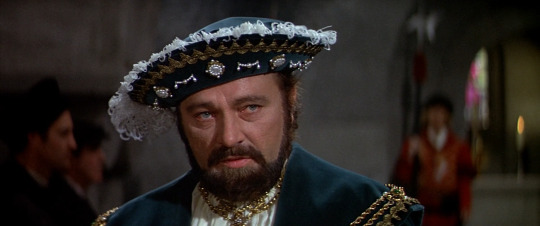
Unfortunately, this is the part of the review where I must tackle the things I disliked about this film. Equally unfortunately, there are quite a lot of them. The elephant in the room is Richard Burton’s depiction of Henry. In both history and popular depictions, Henry was and is the center of his court, someone who shifted from passionately loving Anne to furiously ordering her death on false charges; in any depiction of Anne, he is the other main character. Put bluntly, Richard Burton gives perhaps one of the creepiest portrayals of Henry VIII I’ve ever seen. While not worse than Ray Winstone’s portrayal of Henry as a marital rapist, Burton portrays Henry as a serial sexual harasser and predator. He combines the real Henry’s unshakeable belief in his own self-righteousness with a seedy lustfulness which will stop at nothing, not even claiming he’s only sexually potent with the woman in question, to get into a woman’s bed. There is little trace in this portrayal of Henry’s intellectual or cultural pursuits, and even the times when he exhibits bonhomie feel forced and fake. Furthermore, at only 5’8, Richard Burton is half a foot shorter than the real Henry, meaning he lacks the physical towering presence of the real man; he thus doesn’t physically stand out from his courtiers. In fact, Anthony Quayle as Wolsey is two inches taller than Burton; a screen Henry ought to tower above his courtiers, not vice versa!
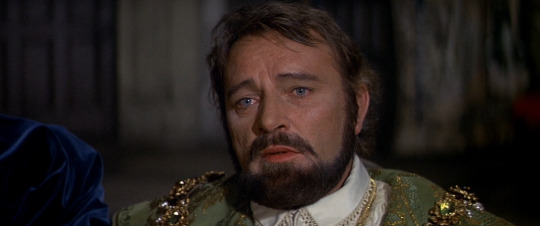
Anne of the Thousand Days also completely misunderstands the history of the period, changing it in ways that not only make no sense plot-wise, but which indicate the writers genuinely did not understand the period. Some inaccuracies stem from changing historiography - despite being named after Anne Boleyn, the movie portrays a less politically active Anne than more recent depictions like The Tudors and Wolf Hall. However, this lack of emphasis was the result of the historiography of the time tending to minimize Anne as a political figure; only in 1986 with Eric Ives’ seminal biography of Anne would attitudes change. The inaccuracies I object to are ones which betray a lack of understanding of the basic nature of the history. I’ve already mentioned one of these inaccuracies (Anne admitting to Harry Percy that she’s not a virgin), but there’s several others. For example, Henry is seriously conflicted about breaking with Rome, stating that it would mean “everlasting damnation” and result in his soul being cast into Hell. However, this fundamentally misunderstands the real Henry’s character. When he decided on a course of action, it was not only incredibly hard to dissuade Henry from it, but he often became increasingly convinced of his own self-righteousness. As a pious early modern king, Henry would not have broken with Rome had he harbored as many doubts about its morality as he does in Anne of the Thousand Days.
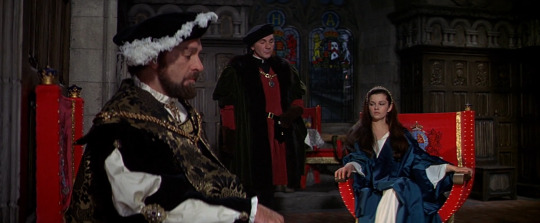
Moreover, the Act of Succession in the movie is passed only after Anne agrees to bring Jane Seymour back to court from a (fictional) exile in Northumberland. Henry himself states that “One daughter is much like another. I care not who’s named bastard when I’m dead.” As this Anne points out, this version of Henry is declining to enshrine their daughter’s legitimacy in law so he can sleep with another woman. Unsurprisingly, this did not happen in real life; the real Henry, no matter how much he wanted a son, would not have shot himself in the foot by doing this! To not pass the Act of Succession wouldn’t just harm Elizabeth, but any children, including a son, he had by Anne; Elizabeth, after all, was only heir in lieu of any sons. These are serious departures which go beyond artistic license and veer into a real lack of historical comprehension.
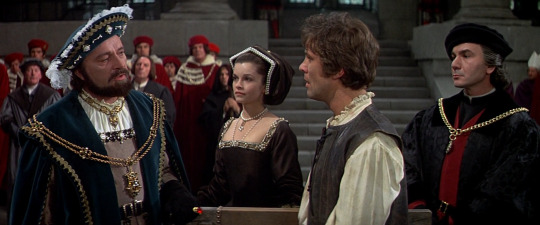
The biggest (and most absurd) inaccuracy, though, comes in Anne’s trial and resulting confrontation with Henry in the Tower. First, Anne is allowed to cross-examine Smeaton, who is brought in, along with her brother George, during the course of the trial. But this greatly downplays just how rigged the real Anne’s trial was, as in real life, no witnesses were called. Even if they had, it is incredibly unlikely Norfolk, who hated his niece in history, would have let her cross-examine them. But then, any semblance of accuracy, realism, or even sense is sacrificed wholly on the altar of drama as Henry himself enters and gets Smeaton to confess that he’s innocent. If this had happened, there would be no reason for Henry to execute him, like Burton’s version promises he’ll do. Moreover, as Smeaton was the only person (both in history and the film) who confessed, retracting his confession would mean there were no witnesses, which would have torpedoed the government’s case against Anne and the men. But Henry does this and then proceeds to mutter, “And yet… it could be true,” which is only explicable in the film if he genuinely thinks Anne is guilty of adultery. The problem is that Anne has never flirted with any of the men on screen; she’s never talked to the ones aside from her brother at all! This means that the accusations of adultery come out of left field, a failure of writing which leaves the viewer wondering where on earth that came from.
PART 2 HERE:
#tudor era#anne boleyn#anne of the thousand days#genevieve bujold#henry viii#richard burton#catherine of aragon#katherine of aragon#jane seymour#elizabeth i#the tudors#I have so much to say about this movie#but it's just not good IMO#Genevieve Bujold Anthony Quayle and John Colicos#as Anne Wolsey and Cromwell#cannot save this movie#tudorerasource#thomas wolsey#thomas cromwell
18 notes
·
View notes
Text
Six: The Musical AU Summary and Background Post
Hi, I'm back with my silly idea :3
Anyways, I guess this is a TSBS AU now? Whatever, I'm having fun >:]
Summary: Six: The Musical is about the six wives of King Henry the XIII. They compete throughout the musical to see who was had it worse through out their time with the king. By the end, they all band together, deciding it's better to just be there for one another.
This AU takes the same premise and has 6 creations made by the Creator compete with one another and see who had it out first. So, that means this AU has 6 characters
Catherine of Aragon - Moon
Anne Boleyn - Ruin
Jane Seymour - Earth
Anne of Cleves - Stitchwraith
Katherine Howard - KC
Catherine Parr - Sun
Each character will have their own individual post explaining their character and will have their designs included as well. So, stay tuned for that ;]
Background: So, in this AU, all six of these characters have met each other in the past. They were all created and tested around the same time. Order of creation is Ruin, Stitchwraith, Moon, Sun, KC, and Earth. This isn't relevant for the timeline in which the songs are sung, but it is important to each of their backstories.
As they were all being test run before being fully operational, they were housed in the Creator's HQ. They were to stay in the testing area and only in the testing area. Some were allowed contact with one another, others weren't. So to some extent, they knew each other.
As said before, the AU follows the premise of them trying to figure out who had it worse while under the Creator's "care" but by the end they realize "You know what? Screw it! Let's just kill this guy"
Yeah, that's the gist of it XD. I'll probably make some animatics for this AU, so feel free to stick around for that :]
#the sun and moon show#tsams#tsams moon#sun and moon show#tsams sun#tsams ruin#mgafs stitchwraith#tlaes earth#tlaes#the earth and lunar show#monty and foxy show#tsbs six au
10 notes
·
View notes
Text
Review: The Concubine by Christopher Bae Rae
TLDR: The first 3 chapters are great, the last third is great, the middle bit is kinda meh. I want to proofread and tweak this book, but overall I could recommend it to someone really into Anne Boleyn.
Overall this is a good depiction of how events evolve, with the delineation of responsibility between King and Cromwell fuzzy. A lot of factors combine to make this storm of disaster.
For @fideidefenswhore xxx many thanks for buying this and The King's Mind for me, I hope the review entertains.
We begin with Anne waiting impatiently for news of the death of 'Aragon' (Chris, please just call her the Princess Dowager. Aragon is not a surname!)
She has chosen Edward for her unborn son's name. A fitting choice, and chock full of dramatic irony, especially as Anne isn't wrong that a king called Edward will 'cleanse England of popery'. Anne's ambition for her son is sad because we know what will happen, but there is an unpleasant streak to Anne who imagines how "sweet" Princess Mary's death would be.
"All is well and all manner of things will be well." It's nice to see Rae has at least a passing knowledge of the Bible- better than most Tudor novelists.
"Her heart was black!"
Anne:

I'm narrowing my eyes at the characterisation of Janes Seymour and Rochford but it's not TOO bad. Could be worse.
Henry examining the heart was a great touch. The tension, the duality of his response: amazement at the human body but also a Christian revulsion/fear/disappointment at its animalness. The tension felt very Tudor, Christian, and (renaissance) humanist all at once.
Also his suspicion at Katherine's death feeds nicely into his paranoia. Will whoever did it stop at Katherine? It's a good moment for his character arc. Anne's laughing at the heart is also in character in a dark-sense-of-humour kind of way.
"Henry does not care to admit it, even to himself, but he sometimes feels a sensation of being overwhelmed by her energy and confidence, an uncomfortable intimation that she does not always quite remember her place. A feeling that she may in some ways be quicker and cleverer than he is."
It would be nice to have some more dialogue. Anne and Henry spend a happy evening together and the narration tells us about it but it would be nice to hear them banter and bounce off each other, especially given what's going to happen.
Henry doesn't seem that enthusiastic about Katherine in his dream but it IS a dream so I wouldn't be surprised if he's got a case of self-serving memory and his brain has retconned any memories of happiness with Katherine.
"The continuance of your house must be seen to be assured, for without that the continuance of their own is in peril." A good point.
Rae handled the yellow-wearing incident well: Anne doesn't want to, but she didn't persuade Henry in time.
"She waves her hand, as if this might be sufficient to consign Mary to some kind of perpetual limbo."
I am very pleased to see an acknowledgement that Anabaptists exist and are persecuted by Protestants, as they're ignored in 99.9% of Tudor novels especially Protestant-leaning novels: "These are madmen, their views are too extreme for any God-fearing Lutheran and they must be suppressed. But such people are a sign of these times." BUT Protestantism is not about going forward, but BACK- back to an ideal golden age late antiquity Christianity of simple purity. Protestantism in this novel comes across like innovation which is certainly not how Protestants like Anne would have seen it. (yes I know the word Protestant itself is anachronistic because it's a 1550s word but bear with me).
Elizabeth Boleyn is well written: blunt, shrewd, loving but not emotive, but also not judged for having a stiff upper lip. "her mother comes and bustles, exuding a strained air of optimism." I like this portrayal of Elizabeth as being strong for other people, it's a nice bit of characterisation for a minor character. There's a good back and forth between Norfolk, Anne and the Boleyn parents.
Fat Wolsey stereotype...did Anne really hate him? Some historians have questioned that. It would have been interesting to see a fresher interpretation of their interactions.
We're leaning hard into the "Thomas More is a sadist torturing people in his house and he loves burning people" myth BUT I will give it half a pass because it's Anne's perspective and it makes sense she'd unquestioningly absorb Protestant gossip. It also leans hard into Fisher and More being personal enemies of Anne, saying they refused the oath to the succession when it was the supremacy More refused to swear to. More was willing to swear to the succession, and it was Anne's own ally Cranmer who suggested a compromise: More swearing to the succession alone.
Opening a chapter with Henry coming to from the jousting accident was very effective because we are like Henry, we don't have the immediate knowledge of what just happened (in theory anyway lol we know the history.)
'Something very bad must have happened to him.' You don't say.
I think Rae's portrayal of Norfolk is a little OTT. Don't get me wrong, I hate Norfolk, I don't give him a nuanced sympathetic portrayal in my own writing- he's ruthless, condescending, materialistic, greedy, and obsessed with hierarchy to the point of comedy- but I think it's OTT to make him literally stinky. Norfolk was a git but he was an aristocratic git, so there's no reason for him not to cover himself in rosewater or musk or civet or rose oil and chew cloves and mint for fresh breath.
"It's not for the first time that she imagines that the duke's death would not cause her any great or lasting sorrow." Spitting facts.
"These men, with their constant needing, wanting, thrusting- can they not ever leave off?" I can see the real Anne thinking this.
Cromwell is called the chancellor, but that was Audley- as Rae says later in the book. What gives? Is this a different chancellorship? Rae really really really wants to keep reminding us that Cromwell is an efficient fixer who knows 'where everything is and who it belongs to.' He is described as having a 'prodigious capacity for work' and I'm pretty sure I've seen that exact phrase in a history book.
Anne's panic and shock written very well: "She stares at the cloth and the stain, as if it is a trick of the light and gazing at it intently enough might cause it to disappear."
Christopher loves adding in definite articles. "The relief floods through her" "the tears staining her pretty cheeks" "a part of" rather than "part of". "Skill at the jousting" "threatened with the torture".
But he also misses out words and letters. I had to silence my inner editor reading this, I was itching to get my red pen, particularly in the middle third of the book. 'You' where it should be 'your', 'away' when it should be 'way' 'when sings' instead of 'when he sings' 'is wife' instead of 'his wife'. 'He is mind is elsewhere'. Sometimes Rae will say the same thing twice but in different words. I'm itching to tidy up some of these sentences.
"Soon enough they are ensconced together in the study very privately and Cromwell can speak his mind having first taken the precaution of having his guest sign a solemn of secrecy."
"Cromwell asks his guest if he would care to view the current progress of the works he is undertaking on the new accommodation and the splendid garden."
"the style favoured by old Granny Beaufort." I'm wincing.
Hire me as a proofreader, Chris!! Let me tidy your sentences!! My rates are super duper reasonable!! ;) xx
"She must be bright and gay" I was surprised to see such an antiquated use of 'gay' in a book published AFTER 2010.
"she must amuse and entertain him as only she can do, she must have faith in their future and give him confidence in it."
The image of their relationship as a sinking ship works particularly well given that ship-jewel she gave him with the self-insert maiden onboard.
If an old woman is talking shit about you why do you eat her gift of pastries?! She's probably spat in them AT LEAST.
Sir 'Nick''s suggestions to Henry are so heavy-handed that the manipulation is almost darkly comedic.
I am narrowing my eyes at Chapuys contemplating 'the austere beauty' of the chapel at Austin Friars. It's just a little early for Protestant whitewash aesthetics to come in. I'll give it a pass.
"The king's amours are not my affair, my dear Eustace."

"I can see that you are unhappy about these arrangements, and of course I sympathise. I do not much like them myself...Seymour having the king's ear, or to dwell on what nonsense he may be pouring into it. But I do not think we should be unduly alarmed about any of this." Cromwell is very clever here, using 'we' and joining their interests together to convincingly sound like he's Anne's ally.
"The ambassador is more than capable of building towering insubstantial castles of speculation in the air; he is also a master of the direct question." Good! But Chapuys would talk of Christendom, not a brotherhood of Catholic nations.
I do think Chris should have read Macculloch on Cromwell, because this Cromwell is too secular. "Survival is in the end his only goal." As Macculloch showed, Cromwell took risks for the sake of the reformation and he also made political errors because he wanted to found a political dynasty through his son Gregory. So Cromwell has multiple motives: yes he wants money, power, prestige, etc., but he is devout too. "not a wit, a raconteur, a teller of tales." It's unfair on Cromwell to portray him as someone who can't amuse highborn ladies: the real Cromwell was an outgoing, hail fellow well met kind of guy.
The Tudor court does feel rather depopulated, Anne is alone with Nan a lot. Where are her other ladies? they tend to vanish.
The king eating partridge with a cherry sauce, a nice detail as IIRC cherries were a favourite of Henry's. "His smile congeals upon his face into a cold mask of reserve."
The memory of being 6 years old and sheltering in the Tower was a good character moment for Henry, especially him recreating the rebellion with his toys. There's a cold pride to Elizabeth of York as well as the typical motherly tenderness, which I like. She was born a Princess after all.
"Do you follow?" He follows. Cromwell has no trouble following." Double meanings! We love double meanings!
Nan Gainsford trying to help Anne by mentioning Mark Smeaton's crush...oh, Nan. A great moment of tragedy. "Cromwell looks at her, quietly recording every word for a remembrance." Later on "Anne nods, as always Nan's good counsel can be relied upon."
I do think this story is missing some key parts, like the scene where Chapuys around Easter 1536 was forced to publicly acknowledge Anne as queen, suggesting the plot to destroy her was rather last minute. Henry orchestrated that little diplomatic trap, and it doesn't really fit Rae's framing of events. Also the countess of Worcester should have been involved in Anne's downfall, but instead it's Jane Rochford.
The meeting with Lady Rochford is enjoyable as fiction but it seems unclear whether she is on Anne's side or not. The real Jane wouldn't want Anne to fall- her fortunes are tied to Anne as history showed: when the Boleyns fell Jane would never be as rich again.
"[Anne] has thought of Cromwell for so long as an ally." Has she??? At the beginning of the book she didn't trust him in the slightest so why is she so taken aback?
"In these times of division and dissent it is so easy to assume that those who share our opinions on matters of faith and religion are somehow bound to be our friends." But she didn't assume!
I like the description of Cromwell being like a bat, it makes a change from comparing him to a pig, which is lazy and boring and unoriginal and uncreative and unfunny.
"Once a single brick is loose, the wall will be brought down quite easily." "this notion, and the twisting, spiralling curlicues of imagined consequence which may issue from it." "the tower of fantasy spirals upwards, out of control."
Henry goes from 'Smeaton won't confess to something that isn't true' to 'I think I've been deceived' back to awareness alarmingly quickly.
"he has endured this kind of assault before, but it was a long time ago, in a blacksmith's yard in Putney, with another man who had absolute power over him". Someone's read Wolf Hall.
Jane Rochford is more malicious here than the evidence suggests.
"She studies Jane's insolent look, and begins to think she might do well to ask George to keep his wife at home in future. If she is allowed to remain at court she will cause trouble somehow. But what ails her? What does she hope to gain from it?"
"he is still a little puzzled by her motivation, because the naïve and trusting might think that her interest lay with the Boleyns since she is married to George, whereas in fact she seems to be determined to do everything in her power to destroy him."
CHRIS. YOU ARE SO CLOSE TO GETTING IT. It's frustrating because Rae is good enough as a fiction writer to spot the obvious holes, but not knowledgeable enough in this history to fix them. Like yes, Anne and George could have sent Jane away if they didn't like her! That suggests they probably DID LIKE HER!
He tries to fix it by having Jane want Anne "disgraced, brought down a peg two, and abandoned by the King...she has done whatever she could think of to help to bring such a conclusion about" that Jane is "nothing more than Anne's lady in waiting." But it doesn't make sense! If Anne were abandoned by the king, this proud and covetous Jane would see her own position decline. She isn't just Anne's lady in waiting- she's her sister in law! She has a fancy bed with Rochford knots and a fancy counterpane! Under Anne's replacement she would just be...another lady in waiting! Also we have Jane's signature and Jane "scratching out her mark" implies she can't write, which is inaccurate.
Smeaton saying "I have risen by my own talents and found favour" is a nice subtle parallel to Cromwell's own rise, which makes Smeaton's fall all the more tragic, as a foil to Cromwell.
Cromwell using the classic 'sign here without seeing the full document because it's hidden by the document above' from I, Claudius.
At Chateau Vert Jane was Constancy IIRC.
"a galliard she knows very well, so beautiful, sad and stately." I think Rae is thinking of a pavane here, a galliard is an upbeat dance.
"although she must suffer patiently the king's delight in revels and pageants, Katherine of Aragon does not care much for this kind of lewd and brazen display, and thinks privately that dancing is a business best left to whores and drunkards." I think this is an unfair portrayal of Katherine. She was pious, but she wasn't a killjoy.
The juxtaposition between Anne falling down into despair next to Henry's mood 'rising' is very effective, like he's draining her like a vampire. Henry believing his own lies and turning his thoughts to "pleasure and pastime with good company". I saw what you did there, Chris.
There are some excellent moments of extreme black comedy in this. "They must believe that there was a conspiracy against myself, not one that has been crudely fashioned against the Queen.' Cromwell winces. Crudely fashioned?"
"It is simple enough, she is to be burned alive, according to the law. This provokes a murmuring from the Lords, and Norfolk looks puzzled until he remembers to add that the king in his great mercy is expected to commute this to beheading."
7 notes
·
View notes
Note
I was reading your posts about how badly most/all historical fiction and period dramas are when it comes to faithful portrayals and was wondering about your thoughts on Wolf Hall, whether you read it, watched it, or both. And also, are there examples that you feel do it well? Or are there examples where they get it wrong but you still enjoy them? (Can you tell I’ve been on a historical fiction kick lately?) I know that’s a lot of questions, so please don’t feel obligated to answer them.
oh boy, this is... complicated. i'll start off with wolf hall, because that will probably be easier: necessary disclaimer that i have not watched or read all of wolf hall, but i have read a significant chunk of the first book.
firstly, i actually enjoyed reading wolf hall a lot. there are a couple of bits that grated me when i read it (iirc it suggests that henry viii was to become archbishop of canterbury before the death of his brother, which is emphatically not true; nitpicky, i know, but it's one of the misleading "fun facts" you often hear about henry viii), but for the most part i found it rather refreshing. i have to praise hilary mantel's writing style, of course; it's beautiful prose, and a relieving change from first person present tense narratives, which are bad. (disclaimer: this is a personal opinion. i happen to think that 99% of all first person narratives are utter shit.) in terms of plot events, i think my favourite parts of wolf hall are cromwell with his wife and children, and him grieving his wife and children; the quiet reminders of their absence are heartbreaking.
now, onto the things i didn't like. i didn't love the tv show; nothing wrong with it, necessarily, it just didn't click with me - and it probably didn't help that when i watched it the screen light to room light balance was very off. and as for mantel herself... quite a few people have pointed out that her treatment of the women (notably anne boleyn and jane parker, her sister-in-law) in her series comes off as misogynistic, and i personally find the treatment of thomas more grating. essentially, she buys into a lot of the old narratives of jane parker being 'scheming' and betraying anne boleyn and her brother george; and her depiction of anne can similarly come off as that of a scheming woman and nothing more. there is an argument to be made that we're seeing this through cromwell's eyes, so naturally he's going to be biased against certain people - but mantel is the writer and she chose what she wrote. she seeks to balance out the classic depictions of cromwell as scheming and more as a literal saint, but it tips over into just making more look like a villain - things such as him choosing to educate his wife are warped into more being... evil? somehow? there's a double standard with cromwell vs the other characters: when cromwell is pious, it's devotion; when more is pious, it's fanaticism, and the same with cromwell vs the women in the books. finally, hilary mantel was transphobic. i'm not here to argue about that one.
granted, i don't think these things make wolf hall unforgivably bad, by any stretch of the imagination. i think it's a complex, flawed book and the same applies to the show. i think this youtube review summarises it well overall - and of course these things are always nuanced and complicated and so on and so forth.
there are shows which do historical fiction absolutely horribly, like the spanish princess. i have no interest in defending that, because, as far as i'm concerned, it's a mess not worth attacking; that's been done to death. i would also consider the vast majority of books by philippa gregory and alison weir to be a major waste of time. weir is also a non-fiction writer, and her non-fiction is exactly as bad, so for the love of good, please don't pick those up either. both authors like to draft in rape, magic (dear god, don't talk to me about the fucking magic), not-like-other-girls female characters, incest (???) and a bucket load of misogyny in lieu of actual plot. neither of them are good writers, either.
onto works which do an alright or complicated job. i think wolf hall belongs here - it does some things very well, some things... not so well. i'd also put becoming elizabeth here - as you've said, this is one where they get things wrong but i can still enjoy it. the show covers the reign of edward vi (1547-1553) and the teenage years of elizabeth i (about 13-19, so literally her teenage years). the good parts? it's a fantastic depiction of edward vi and mary - both are brilliantly cast and the acting from them is amazing. it incorporates black characters into authentic period roles, the clothing is really well done, and it shows most of the important parts of edward's reign. the bad parts? well, elizabeth is played by a woman in her late twenties. this lets the whole thing down, frankly. it's supposed to be a show about elizabeth, and yet edward or mary could easily replace her as protagonists - i don't think the actor playing her is great, personally. and then there's the fact that this show portrays the grooming of elizabeth by thomas seymour. the show actually makes their relationship out to be genuine and the two sleep together, a deviation from history and a particularly troubling one given that the real elizabeth was uncomfortable with seymour's advances and actively tried to avoid him. it also spends six of its eight episodes on seymour when seymour was beheaded a third of the way through edward's reign. thus, it has its upsides and its major downsides - oh, and the characters say fuck a lot, which is mildly annoying. but i can enjoy it, as long as elizabeth's not talking and they're not focusing too much on seymour... a bit of a letdown from a show supposedly about her.
there's also the tudors, which is a bit of a mixed bag - it makes some inexplicable changes from history, but it often uses quotations from tudor sources in its dialogue. the casting can be a bit... wonky, but it does have its moments, and offers a somewhat more balanced version of more vs cromwell. i don't particularly like it because it often modernises the characters a bit - and i don't want that! making characters act like modern people seriously misses the point: this is historical fiction, not a modern thriller or whatever. the girlbossification of historical women who were often seriously held back by the men around them and wielded influence in rather different ways to what we think of as strong women is exhausting.
and there is historical fiction which i really enjoy. dissolution (and its sequels) is a murder mystery series by c. j. sansom, narrated by the fictional matthew shardlake, a disabled king's commissioner working for cromwell. he ends up investigating the murder of another commissioner at a monastery in scarnsea. it deals with the issues of religion, gender, and disability in very interesting ways; matthew is not infallible and clearly holds some very tudor views of the world. it's a richly-written world and it really does feel like you're in 1530s england, and i really recommend it. i also like becket (1964) and the lion in winter, neither of which are particularly striving for accuracy - but they're good dramas and brilliantly acted, and, you know, maybe henry ii was secretly in love with thomas becket. (both are heartwrenching films and i will never be over: 'You give the lions of England back to me like a little boy who doesn't want to play anymore. I would have gone to war with all England's might behind me, and even against England's interests, to defend you, Thomas. I would have given away my life laughingly for you. Only I loved you and you didn't love me. That's the difference.' my feelings on bill (2015) are more or less the same - it's an intentionally ahistorical film, and it works because it's well-written and not trying to accurately represent the past. the '70s series like the six wives of henry viii and the shadow of the tower are really enjoyable, too - because they actually cared about making decent series about the tudors relying on the actual events which transpired during the era!
i'll leave the question of costuming out in the open; i think this youtube video has some good points on whether period-accurate costuming is essential. i like it, personally, but i'm not going to be furious at a missed french hood; the only thing that will truly make me furious is a french hood with no veil. either bother, or don't bother! don't... don't do neither, jesus christ! as for historical accuracy in general - i think that's a question which will never have one true answer. personally, i do value a rough adherence to the historical timeline, at least for fairly well-know facts like, i don't know, henry viii having two sisters? why does the tudors merge them into one person? what? anyway. i think these posts offer some valuable insight into how vague and murky a concept historical accuracy really is and how it can be wielded as a weapon against people rather than in the interests of a good story (read at your own peril - they are quite long). there is also the problem of hindsight - as readers, we know that edward vi will die at only fifteen. the average person at the time did not! well, not until 1553. the point is, books where the narrator has seemingly prophetic powers or knowledge of future events are unrealistic. what i think is most important is writing stories that more or less accord to the timeline of history in the general details and capturing the attitudes of people who lived in the past decently. this is what really brings historical fiction to life, in my opinion. these also offer up good opportunities for parody and satire - a film which intentionally gets history wrong Because Incest is frustrating, but a film which intentionally gets history wrong to parody it, like blackadder, can be incredibly entertaining. inaccuracy is not always bad. that said, if you don't make henry viii ginger, i will hate you forever. soz. as for language - it's ridiculous to expect dialogue to be written 100% in middle english or what-have-you, but the occasional 'god's bones!' instead of 'oh my god' would be nice, and an avoidance of just putting a load of fucks in there...
and finally, for the elephant in the room... misogyny. there are certainly other -isms which permeate historical fiction as they do everything else, but this is the big one. so many depictions of women in historical fiction uncritically buy into the narratives of misogynistic medieval commentators which we have inherited from centuries of men recycling them. like calling women sluts, or witches, or writing them as genuinely sleeping with a male relative - taking the slander against them literally. like boxing women into a few stereotypes - docile and submissive; scheming bitch; old hag; and whore. like sexing up rapists and groomers. like forgiving historical men for things we condemn historical women for.
i hope this helped! i have many thoughts, none of which are easily summarised. i don't know if there's a right answer to this. but i do know one thing: the white princess is bad. thank you for the ask!
9 notes
·
View notes
Note
I see you still don't see my point and keep twisting my words to show your brainless fans how great you are because you are afraid they'll see who you really are. The truth is you won't feel the need to write your fantasies about reader being dominated by masculine and violent aemond if your husband was satisfying for you. We all know why Stephanie Meyer or E.L.James started to write their wish fulfillment fantasy. They weren't able to get something great from men in their life so they created naive, helpless and stupid characters to try to experience something this way.
I've got a huge list of how your readers imitate bella and/or anastasia so you could live your dream of being dominated in bed and manipulated this way. If it turns you on, fine. As if the only way to get a men is to be obedient good girl. Well I'll tell you a secret, you don't need to offer yourself on golden tray to have him on his knees. But majority of women just like to be weak, play the victim and just be passive, lying in bed accepting things. Patriarchy is still strong.
And one of your answers proved that I am right. "In my opinion, a woman who "fights and opposes in such times" will simply be punched in the face, because who is she in relation to her husband? I approach it logically, not with dreams of what it might have been like if feminism had existed back then. I don't think this makes my characters weak - they try to cope with what they have." Darling, fighting and opposing in such times doesn't have one face. I've never said lady B has to fight with aemond with sword. i meant feminine way. how do you think women get their power, like Anne Boleyn, Hürrem Sultan, Elizabeth Woodville? They weren't known for their beauty. However they possessed only 1 thing beauty will never replace - intelligence. If they were stupid they'd never be anything more than baby machines and sex toys. But they were smart, used all they had and achieved more than any of thousands poor distressed nobodys. They show determination, resilience and self reliance which allowed them gain something in very patriarchal society. They understood men's games and beat them at their own misogynistic games. That's why there are so many films, tv shows or books about Anne Boleyn and zero about Jane Seymour and her uninteresting story of serving men, her lord and king. And I am afraid that's what Alys will do with Aemond once she will got her claws in him. Good for her. I hope you'll be enjoying her ruling with her pussy. Maybe take a note from her.
Lady B fighting with Aemond with swords it's pointless, she would lose anyway. I mean at this point, after 50 chapters, I think you purposely keep lady B in place of no growth. She doesn't know how much power is between her legs, she hasn't learned anything about aemond (if she had learned she would have manipulated him, but this is too complicated for her poor brain) and men in general (despite being close to her father and brother) and at this point I think she's just being intentionally dumb. Feminism didn't exist back then but if you think writing about a character with Stockholm syndrome and martyr syndrom makes her or this story great you are mistaken. There is no honour in just existing, bearing things, being manipulated and lied to and then you try to tell readers it's liberating. Darling, I see you encountered abusive and terrible men throughout your lifetime who made you believe such things but another secret from me: women are able to gain nearly anything if only they learn men have always had problem with women they couldn't control. You know I really pity you, men in your life must've hurt you a lot so you decide to write a story which message is: just accept it, even if he emotionally abused you you should be thanking him. You just show how you perpetuate patriarchy in simplest way possible. Accept scrumbs from men's tables, beg for their attention and you won't be neither loved nor respected. But you don't seem to mind at all, so there's no difference for you in there.
I can't believe you devoted half an hour of your life to write such bullshit, feeling like Plato, thinking that you sound smart and can make ma sad. I'm impressed. I didn't read even half of this gibberish, I thought you were an unfulfilled woman after you started writing about my sex life and relationship with my husband.
Next anon from you and I will block you, so this is our farewell post my love 💐💐💐💐
I love how you humiliated yourself with this message and how you showed the level of your criticism

17 notes
·
View notes
Text
Hi have this random RTC/SIX shitpost
So each member of the choir competes for the chance to come back to life, and each SIX queen competes to be the leader of the band, so I decided to merge my two favorite musicals in a way that makes sense
Catherine of Aragon - Ocean O’Connell Rosenberg. She’s always thinking she’s the best and it makes sense as Aragon was also very religious and the first to sing
Anne Boleyn - Ricky Potts. They’re both just tryna have a good time and are roped into things they had no control over. And both of their songs are straight bops
Jane Seymour -Jane Doe/Penny Lamb (DUH!) The aspect of death is strong with both Janes, but I feel Penny herself is a sensitive person much like Jane S
Anne of Cleves -Mischa Bachinski. Come on. They both sing/rap about money. It fits like a glove. And also, Mischa just has that essence of Cleves energy in how brash he can be
Katherine Howard - Noel Gruber. Although Noel fantasizes about having a promiscuous life, Katherine was thrown into one she didn’t have control over. And she was forced to keep that secret, much like Noel was forced to repress his homosexuality
Catherine Parr - Constance Blackwood. They both reform the contest and make the others realize how it isn’t important who leads or who comes back, but their lives and their experiences were the true things they needed to think of
But that’s my two cents, I’m not sure it’s all that accurate but hey! I had fun ;)
#ride the cyclone#six the musical#i think that scene where aragon is comparing her life to the others#is EXACTLY like ocean in what the world needs#sydneys weirdness#rtc#six
30 notes
·
View notes
Note
Mary I was really delusional about Elizabeth's paternity. She would tell anybody who would listen that Elizabeth looked like Mark Smeaton, when Elizabeth looked almost like a carbon copy of her father,
I wouldn't say she was delusional, but rather that insisting to herself and others that Elizabeth wasn't really her sister was Mary's way of compartmentalizing.
According to Lancelot de Carles, despite the adultery allegations (might this have been after she was informed that the alleged dates in question began in October 1533? If so, she was far less credulous than Chapuys, who seemed to have used this information to conclude Elizabeth was going to be declared 'the daughter of Norris', the first man accused in the consecutive list of dates, and had to quickly retract this claim), Mary in 1536 actually expressed no doubt whatsoever that Elizabeth was truly her sister:
"'And, since her daughter is the king's, I promise
That, to the best of my ability, she should never want for anything.'"
The story of the death of Anne Boleyn : a poem by Lancelot de Carle, JoAnn DellaNeva (Translator, Editor, Writer of added commentary)
This was a common refrain for Mary in the 1530s, she told the Duke of Norfolk in 1533, also, something similar:
True, if the King, her father, acknowledged [Elizabeth] as his daughter, just as he called the duke of Richmont his son, she could treat the latter as brother, and her as sister, but in nowise as princess
And later, in her letter to Cromwell in 1536:
concerning the Princess (so, I think, I must call her yet, for I would be loth to offend), I offered at her entry to that name and honor to call her sister, but it was refused unless I would also add the other title unto it; which I denied not then more obstinately than I am now sorry for it, for that I did therein offend my most gracious father and his just laws; and now that you think it meet, I shall never call her by other name than sister."
And then we arrive to the 1550s, which is when Mary was reported to have claimed that Elizabeth was, in fact, not her sister at all (not just by Jane Dormer much later, but by Philip II's confessor at the time). Generally the argument presented for this was that she simply didn't want Elizabeth to be heir due to her religion, but I find that reductive. This was definitely an element, but once it's set into relief and context, I believe she came to claim that Elizabeth wasn't her sister because, if she wasn't her sister, she didn't owe her honour and respect, and thus had no moral imperative or obligation to treat her well.
I really liked Becoming Elizabeth's portrayal of Mary's sibling relationships, but my reaction was not quite the fandom reaction (if you can even call Tumblr that...tbh, it's so small and insular that I almost feel a show doesn't really have a fandom until it's hugely active on Twitter or TikTok, largely because I feel had BE been when the episodes were coming out, it would have been renewed). I don't really get misty-eyed over Mary's relationships with her siblings. She had affection for Edward and Elizabeth, but underneath that affection was always her belief that she was innately superior to them. Granted, I don't believe Mary was like, this merciless bully towards her younger siblings...especially because that belief went both ways (it's clear from his letters and diary entries that Edward VI also believed himself innately superior to Mary, and the subtext of the Micheli report was that not only did Elizabeth not consider herself inferior to Mary, she considered herself superior to her). Tl; dr I'm not sentimental over these relationships, but I find them, in all their dynamics and facets, quite fascinating.
6 notes
·
View notes
Note
What do you mean with Anne boleyn was the only wife who only wife who had a masculine side to her relationship with Henry?, I dont doubt you im just curious esp since I know that at least some of the other wifes did also from my pov lean into a more masculine side now and then.
I want to preface this with I am not diminishing Anne's femininity, she was very feminine but knew how to use her masculine side too.
In the list of Henry's ministers and their influence, we clearly include Anne in between Wolsey and Cromwell with some coinciding of More, and this is for a large period of time. Anne clearly was able to occupy the masculine sphere and act independently with the same freedoms as one of Henry's male chief ministers would. Even when Wolsey was in his final glory days and in his descendency Anne was privy to conversations between the King and his then chief minister while slowly becoming his successor.
When I said that initial comment, Anne was the only wife Henry initially had no qualms about occupying and allowed and fostered this masculine side of Anne to be present until the full ascendence of Cromwell where the traditional norm went back in place of Henry's wife and minister being two separate roles.
After all, there is also a lot of masculine iconography and objects that are associated with how Henry treated Anne in her rise as Queen Consort, she was created a peeress in her own right with a title related to his paternal line not his maternal line (and we can see both the feminine and masculine versions of the title were used), she was crowned with St Edwards Crown and St Edwards Chair something only King Regnants were allowed to use.
Yes, other wives may have occupied a masculine side but as you said now and then, and arguably when either Henry was away with the wife at the time acting as regent or when they were in Henry's very very good books. None as long as Anne was and not as successfully without outer influences, part of this was she was able to balance Henry's feminine side as well while still making him feel like a man (an awful sentence I know I apologise).
Now, his most favourite wives arguably from my POV were Jane after her death and Kathryn Howard before her downfall who wholly occupied the more feminine spheres of the era one being the perpetual mother and the other being his jewel of womanhood. Henry only wanted his wives after Anne to occupy the feminine.
#replies#anonymous#anne boleyn#henry viii#I am writing this at 2am so please forgive me if I jump quickly between thoughts with no connection; may clean up later.
44 notes
·
View notes
Note
I saw your post about Sirius being Anne Boleyn.
So, you know those reaction video? Can you write about Arcana Twilight boys react to themselves in another alternate universe about them being the Six wives?
Also, Summoner as Henry the 8th. It's funny!
LMAO THIS WILL BE HILARIOUS 💀
Ex wives
Arcturus: He really like the introduction but was very confused why it started with divorce, dead, died, divorce, dead and survive. He will ask the Summoner about humans history later.
Spica: he think the outfits are bit too revealing. Other than that, he likes the beats.
Pollux: Poll was like 'WOW' the whole time. He is so gorgeous in that universe. Literally admiring himself lmao and called Alpheratz an old lady too.
Alpheratz: he still look handsome as ever.
Sirius: Green does suit him and he look very fashionable. Kinda wondering why Vega has a smug look the whole introduction.
Vega: know about the history and know that shits going down. Seeing Sirius as Anne Boleyn already make him almost laugh. But then again, he have to hold his laughter.
No way - Spica as Catherine of Aragon.
Arcturus: *shocked pikachu face* Spica is Summoner's wife and Summoner is cheating on him with Sirius?! He almost fainted but Spica caught him.
Spica: he know that's him in other universe but somehow he feel pissed of at Sirius. Image having a family with your husband but then he cheated on you none than other but your colleague.
Pollux: *Shocked Pikachu face #2* he recorded it to use it as a blackmail. Still haven't recovered by the sudden news hit him though.
Alpheratz: he is going to tease Spica forever for this.
Sirius: he laughed for the entire video. It's just a pure gold comedy for him.
Vega: is recording Sirius laughing for the whole situation just so he can replay his laugh when Sirius turn come.
Don't lose your head - Sirius as Anne Boleyn
Arcturus: oh boy, this gave him heart attack. It explains the song introduction.
Spica: slander Sirius for it such as "that's what you get for stealing someone's man." he is enjoying this.
Pollux: almost cry to be honest. Image seeing your friend from another universe got beheaded by Summoner from other universe. He doesn't like it anymore. Also, it explains why Vega hold his laughter for the whole time.
Alpheratz: that took turn really fast. He thought it's just hilarious story but oh boy. He was wrong. Probably won't be able to sleep for a while after seeing a guy you dislike got beheaded.
Sirius: drop his smile as soon the song getting darker in beats. He is mad at his other self for marrying the other Summoner.
Vega: literally replays Sirius laughter a lot of time just to pissed him off. Everyone started to think Vega is a psychopath for smiling throughout the video.
Heart of Stone - Arcturus as Jane Seymour.
Arcturus: he is crying. He feels bad for his own son from another universe and also himself. They have something in common which is hope.
Spica: Spica was like, oh this is so Arcturus and yeah he was right. Almost drop a tear but hold it. The song is so sad for him and it sadden him more to see Arcturus in that universe hoping for Summoner's love is permanent.
Pollux: he is crying like a baby to be honest. Had Alpheratz as his pillow to wipe of his tears. Arcturus is so sweet in every universe.
Alpheratz: crying mentally on the inside. He won't make fun of anyone who cry at this song because it's cryable.
Sirius: the situation is so tense even for him so he tried to bright up the mood with patting Arcturus's back. Vega slap his hand though.
Vega: he slap Sirius's hand because he's the one who want to comfort Arcturus.
Get down- Alpheratz as Anna the Cleve
Arcturus: this song teach him the term of gaslight, girlboss and gatekeep. He really like Alpheratz attitude in there.
Spica: "why can't you be more like her?" he said to Alpheratz with a grin. Marriage that didn't last for a year, oh how he love to hear scandal.
Pollux: regret calling Alpheratz in that universe an old lady. In fact he is admiring the other Alpheratz more than the original one.
Alpheratz: proud of himself. He frowned at Spica's comment and said "Image getting divorced because you're old." Spica all frowned at that.
Sirius: he secretly proud- yeah a big surprise. He likes this song more than his own.
Vega: still surprised that Alpheratz as Anna the Cleve. They both have huge difference personality but it's funny to see Alpheratz acting like Girlboss.
All you wanna do - Pollux as Kathryn Howard.
Arcturus: he was wondering why Vega insisting on throwing Pollux to his room again. Oh boy, once he heard the song he felt his heart shattered to pieces.
Spica: he is glad he shove Pollux back to his room. Even if Pollux is not that innocent, he can't handle another crying person. Arcturus already have his eyes red from crying. It was disturbed and sad.
Pollux: still wondering why the hell he can't listen to the song and why when he came back, Arcturus and Alpheratz won't stop stop hugging him.
Alpheratz: he was disgusted at those people who harassed Pollux from another universe. He even scream when Pollux was beheaded for false accusations. Once he get out from here, he's going to treat both Pollux and Arcturus a nice meal-
Sirius: had his jaw dropped the whole time. He really doesn't enjoy this anymore. Yeah all of it start with nice stuff but this? It's too much even for him.
Vega: he feel bad for both Kathryn and Pollux in that universe. Vega is a big fan of Kathryn back in Middle Eartheim when he was learning England history
I don't need your love- Vega as Catherine Parr
Arcturus: Vega voice is very majestic and he is proud of other Vega too. This stopped the whole room before it get flooded with tears.
Spica: really glad everything come to the end. He hopes from the dead one rest in peace-
Pollux: is proud for other Vega for not needing her husband love anymore. Listening to Vega's singing wanting him to karaoke with Vega again.
Alpheratz: they both have huge difference personality. Somehow, Alpheratz commenting to Vega for the whole video.
Sirius: "hey, how come he gets the cool part?" -Sirius 2023. Still not over the fact he got beheaded.
Vega: "because unlike someone I don't see the reason why I should steal someone's husband to climb the throne." -Vega 2023. Yeah he and Sirius having a beef after this.
#arcana twilight#arcana twilight sirius#arcana twilight alpheratz#arcana twilight pollux#arcana twilight vega#arcana twilight arcturus#arcana twilight spica#six the musical#arcana twilight mc#artw text#artw ask
47 notes
·
View notes
Text
I've bounced the idea around since like 2020 of the micronations putting all their talents/specialties together to make a ragtag theatre troupe. Specifically, I think they'd put on an amazing amateur Six.
Catharine of Aragon: Seborga
Seborga as Catherine just makes sense to me. Aside from the easy Catholic/Vatican motifs, it also works since he was the "first" micronation of the group. He's the oldest and arguably the most rational. They have similar vibes.
Anne Boleyn: Aerica
I headcanon that he's fluent in Quebecois French, so I think he'd like to have a role that nods to it. Plus, his over-the-top personality and eccentricity remind me of Anne. He's bold and fun and creative, yet like her, he's a nervous kid looking for the right thing to do.
Jane Seymour: Hutt River/Molossia/Sealand
I really want to say Hutt River because it would work SO well if he used this as a way to say a final goodbye. He's done his best and stayed with Australia, his boss, etc, but now he's dying. He's leaving Wy behind. It also fits his general vibe, and he'd love a huge, dramatic number.
It would be a really interesting take on Molossia's relationship with America. His official notes say he's independent "for now," and he's made it clear that he loves (it at least respects) America. He wouldn't leave him even if he could. But at the same time, that's basically signing his own death certificate.
Sealand. Dear God, this works so well. Aside from the literal "heart of stone" references to both the fort and his human name, Sealand is loyal and determines to a fault. He's stayed with his bosses and friends, and despite all he says, he canonically does care about England—or, at least he doesn't hate him as fanon can suggest. He just wants to be with people, but that's the very thing that killed Jane. Also, blue motifs lmao.
Anna of Clives: Kugelmugel
My main rationale is that he's German (well, Austrian). Though it also works on a meta level, too. Design-wise, he reminds me a lot of Prussia. Having Kugel sing about just loving himself feels so sweet, both for himself and for his... brother? Cousin? Uncle?
Katherine Howard: Hutt River/Sealand
I really want to say Sealand. The song intentionally uses more "kiddy" language, and having someone physically younger would highlight that in a terrible poetic way. Plus, Sealand's tried over and over to get someone to love and care (or literally buy) for him. It's like his whole thing. The irony of seeing him finally give up as Katherine has such literary potential.
Hutt River would also be great. His personality fits very well, and again, him "giving up" can work on the micronation level as well since he was dissolved.
Catherine Parr: Wy
I can't think of anyone better. It feel like the obvious choice.
#six the musical#hetalia#hetalia world stars#hetalia micronations#hws sealand#hws kugelmugel#hws molossia#hws ladonia#hws seborga#hws hutt river#hws aerican empire#hws wy#hws micronations
8 notes
·
View notes